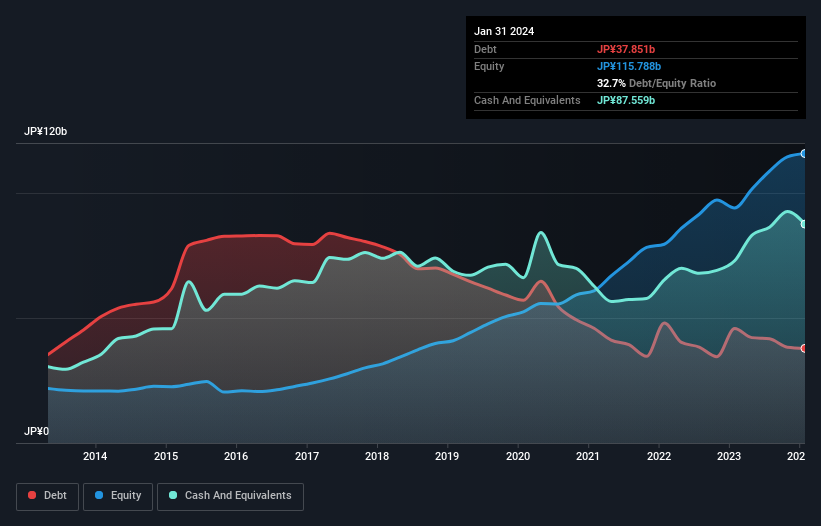
Some say volatility, rather than debt, is the best way to think about risk as an investor, but Warren Buffett famously said that 'Volatility is far from synonymous with risk.' When we think about how risky a company is, we always like to look at its use of debt, since debt overload can lead to ruin. Importantly, Kobe Bussan Co., Ltd. (TSE:3038) does carry debt. But should shareholders be worried about its use of debt?
What Risk Does Debt Bring?
Debt and other liabilities become risky for a business when it cannot easily fulfill those obligations, either with free cash flow or by raising capital at an attractive price. Part and parcel of capitalism is the process of 'creative destruction' where failed businesses are mercilessly liquidated by their bankers. However, a more common (but still painful) scenario is that it has to raise new equity capital at a low price, thus permanently diluting shareholders. Of course, debt can be an important tool in businesses, particularly capital heavy businesses. The first thing to do when considering how much debt a business uses is to look at its cash and debt together.
View our latest analysis for Kobe Bussan
What Is Kobe Bussan's Debt?
As you can see below, Kobe Bussan had JP¥37.9b of debt at January 2024, down from JP¥45.8b a year prior. But it also has JP¥87.6b in cash to offset that, meaning it has JP¥49.7b net cash.

How Healthy Is Kobe Bussan's Balance Sheet?
The latest balance sheet data shows that Kobe Bussan had liabilities of JP¥39.1b due within a year, and liabilities of JP¥48.6b falling due after that. On the other hand, it had cash of JP¥87.6b and JP¥23.1b worth of receivables due within a year. So it can boast JP¥23.0b more liquid assets than total liabilities.
This surplus suggests that Kobe Bussan has a conservative balance sheet, and could probably eliminate its debt without much difficulty. Succinctly put, Kobe Bussan boasts net cash, so it's fair to say it does not have a heavy debt load!
Another good sign is that Kobe Bussan has been able to increase its EBIT by 22% in twelve months, making it easier to pay down debt. The balance sheet is clearly the area to focus on when you are analysing debt. But it is future earnings, more than anything, that will determine Kobe Bussan's ability to maintain a healthy balance sheet going forward. So if you want to see what the professionals think, you might find this free report on analyst profit forecasts to be interesting.
But our final consideration is also important, because a company cannot pay debt with paper profits; it needs cold hard cash. Kobe Bussan may have net cash on the balance sheet, but it is still interesting to look at how well the business converts its earnings before interest and tax (EBIT) to free cash flow, because that will influence both its need for, and its capacity to manage debt. Looking at the most recent three years, Kobe Bussan recorded free cash flow of 47% of its EBIT, which is weaker than we'd expect. That's not great, when it comes to paying down debt.
Summing Up
While we empathize with investors who find debt concerning, you should keep in mind that Kobe Bussan has net cash of JP¥49.7b, as well as more liquid assets than liabilities. And we liked the look of last year's 22% year-on-year EBIT growth. So is Kobe Bussan's debt a risk? It doesn't seem so to us. Over time, share prices tend to follow earnings per share, so if you're interested in Kobe Bussan, you may well want to click here to check an interactive graph of its earnings per share history.
Of course, if you're the type of investor who prefers buying stocks without the burden of debt, then don't hesitate to discover our exclusive list of net cash growth stocks, today.
Valuation is complex, but we're here to simplify it.
Discover if Kobe Bussan might be undervalued or overvalued with our detailed analysis, featuring fair value estimates, potential risks, dividends, insider trades, and its financial condition.
Access Free AnalysisHave feedback on this article? Concerned about the content? Get in touch with us directly. Alternatively, email editorial-team (at) simplywallst.com.
This article by Simply Wall St is general in nature. We provide commentary based on historical data and analyst forecasts only using an unbiased methodology and our articles are not intended to be financial advice. It does not constitute a recommendation to buy or sell any stock, and does not take account of your objectives, or your financial situation. We aim to bring you long-term focused analysis driven by fundamental data. Note that our analysis may not factor in the latest price-sensitive company announcements or qualitative material. Simply Wall St has no position in any stocks mentioned.
About TSE:3038
Kobe Bussan
Primarily engages in the operation, management, and franchising of retail stores in Japan.
Flawless balance sheet with moderate growth potential.
Market Insights
Community Narratives


